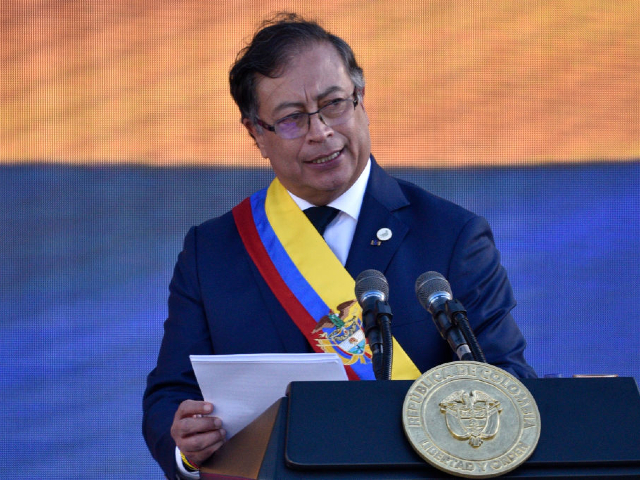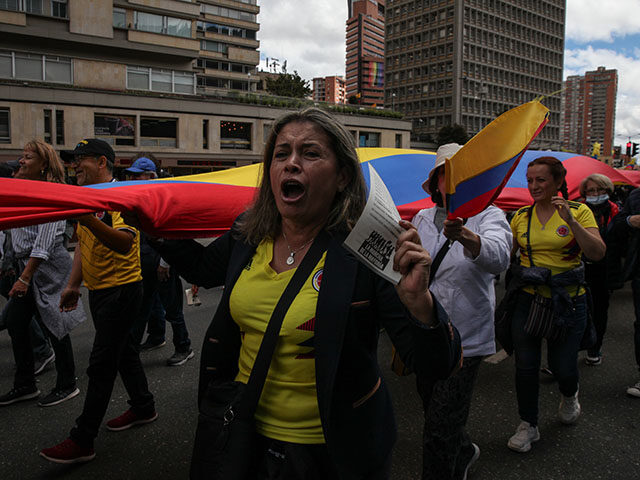More than 90,000 Colombians gathered on the streets of 15 of Colombia’s main cities on Tuesday in the latest round of peaceful protests against radical leftist President Gustavo Petro and the leftist reforms his government seeks to implement.
Tuesday’s activities, branded the “March of the Majority,” also served as a “countermarch” in response to a rally that Petro’s sympathizers organized in support of the far-left president on June 7.
Petro, a former member of the Marxist M19 guerrilla, took office in August, becoming Colombia’s first-ever leftist president. Since then, his administration has sought to implement significant reforms to Colombia’s labor, health, pension, and other sectors, which has prompted his opponents to organize peaceful protests on a nearly monthly basis.
Petro has failed to implement his reforms and faces new challenges after breaking an alliance between his government and other political parties in April that had given his coalition a majority of votes in Congress.

President of Colombia Gustavo Petro speaks during the presidential inauguration at Plaza Bolivar on August 07, 2022, in Bogota, Colombia. (Guillermo Legaria/Getty Images)
According to Colombia’s Director of Police Security Carlos Rojas, the nation’s police forces estimated that roughly 92,000 citizens participated alongside politicians, retired military officials, and social activists in Tuesday’s peaceful protests. Some 30,000 citizens participated in the march held in the capital city of Bogotá. Police authorities reportedly did not find any evidence of public disorder during the event across all participating cities.
The peaceful protesters, most of whom wore white shirts or the Colombian soccer national team’s yellow shirt, waved their country’s flags and shouted chants such as “no to the Petro reforms” and “we’re the majority.” Many used whistles to make noise.
“Cali is one of the cities most affected by the destruction of socialism and progressivism, here there is only poverty and delinquency,” Colombian Senator María Fernanda Cabal said during the march. “This is what Petro is bringing to Colombia, delinquency. They continue killing people, they continue not fighting drug crops. This is a civil society campaign fed up with the mafia stealing the presidency of the Republic.”
Petro attempted to downplay Tuesday’s protests, describing them as “weak,” claiming the peaceful protesters “failed to fill” Bogotá’s Bolívar Square by posting a birds’ eye photo of the square on his Twitter account. Colombian magazine Semana refuted Petro’s claims, asserting that the picture Petro posted on Tuesday was taken prior to the square being filled up by protesters.
The peaceful protesters also took the streets to express their contempt over “Nannygate,” a complex scandal that erupted this month from accusations of abuse of power and illegal wiretapping involving Petro chief of staff Laura Sarabia and former Colombian Ambassador to Venezuela Armando Benedetti, both key members of Petro’s inner circle.
Due to the contents of a series of leaked audios in which Benedetti is heard issuing profanity-laced threats to Sarabia, the original scandal resulted in the Colombian National Electoral Center opening a probe into Petro’s 2022 presidential campaign for possible irregularities in its financing.
Some of the protesters reportedly expressed their rejection of Petro’s handling of negotiations with the Marxist People’s Liberation Army (ELN) terrorist group. Sources within his administration confirmed to local media last week that Petro is studying the possibility of establishing a fund to allow foreign countries to donate “financial contributions” to the terrorist organization so that they stop “committing crimes” against Colombian citizens.
Petro’s reforms suffered a new major setback on Tuesday, when his highly controversial labor reform bill was shelved by the Colombian Congress due to a lack of required quorum to begin its first debate in the lower house.
Petro lamented the “collapse” of his labor reform on Tuesday afternoon via Twitter, blaming its failure on “owners of capital and the media” that, according to him, managed to co-opt Congress against the “dignity of the working people.”
Petro has experienced a steady increase in his disapproval ratings since taking office in August. On Tuesday, Colombian polling agency Datexco published the results of its latest poll, which shows that Petro’s disapproval ratings currently sit at 60 percent.
Christian K. Caruzo is a Venezuelan writer and documents life under socialism. You can follow him on Twitter here.

COMMENTS
Please let us know if you're having issues with commenting.